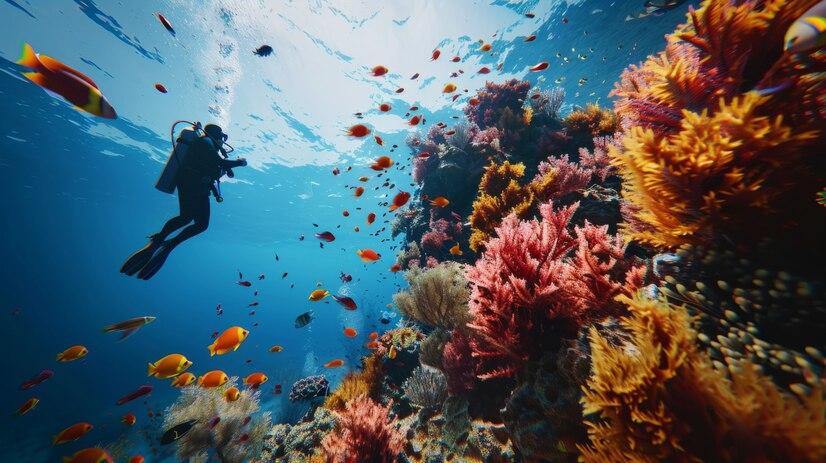How to Choose the Right Scuba Certification for You?

Introduction
Diving into the underwater world is a thrilling experience that offers unparalleled beauty and adventure. However, before embarking on this journey, it's essential to obtain the proper scuba certification. With numerous options available, choosing the right one can be overwhelming. This comprehensive guide will help you navigate the world of scuba certifications, ensuring you select the best fit for your diving aspirations and experience level.
Understanding Scuba Certifications
Scuba certifications are standardized training programs that equip individuals with the knowledge, skills, and confidence to dive safely and responsibly. These certifications are typically issued by recognized diving organizations, such as PADI (Professional Association of Diving Instructors), SSI (Scuba Schools International), and NAUI (National Association of Underwater Instructors).
Factors to Consider When Choosing a Certification
-
Experience Level:
- Beginner: If you're new to scuba diving, start with the Open Water Diver certification. This course provides the fundamental skills and knowledge required for diving in open water under the supervision of a dive professional.
- Experienced Diver: If you have some diving experience, consider the Advanced Open Water Diver certification. This course expands your knowledge and skills, allowing you to explore deeper waters and try out different diving activities.
- Professional Diver: If you aspire to work in the diving industry, explore professional-level certifications like Divemaster or Instructor. These programs offer in-depth training and prepare you for leadership roles.
-
Diving Goals:
- Recreational Diving: If your primary goal is to enjoy recreational diving, the Open Water Diver and Advanced Open Water Diver certifications are excellent starting points.
- Specialty Diving: If you have specific interests like wreck diving, underwater photography, or deep diving, consider specialty courses that focus on these areas.
- Professional Diving: If you want to pursue a career in diving, professional-level certifications are essential.
-
Time Commitment:
- Open Water Diver: This certification typically requires 3-5 days of classroom instruction, pool sessions, and open water dives.
- Advanced Open Water Diver: This certification usually takes 2-3 days of classroom instruction and open water dives.
- Specialty Courses: The duration of specialty courses varies depending on the specific area of focus.
- Professional Certifications: Professional-level certifications can take several weeks or months to complete.
-
Budget:
- The cost of scuba certifications can vary depending on the diving organization, location, and course content.
- Consider the long-term benefits of investing in a reputable certification that will provide you with valuable skills and opportunities.
-
Location and Availability:
- Scuba Certification Near Me: Research diving schools and organizations in your local area or travel destination.
- Ensure the certification you choose is offered by reputable instructors who have a proven track record.

Popular Scuba Certifications
- PADI Open Water Diver: This is one of the most recognized scuba certifications worldwide. It provides a solid foundation for diving in open water under the supervision of a dive professional.
- SSI Open Water Diver: Similar to the PADI Open Water Diver, the SSI Open Water Diver certification offers a comprehensive introduction to scuba diving.
- NAUI Open Water Diver: NAUI's Open Water Diver certification is another popular option for beginners.
- Advanced Open Water Diver (PADI, SSI, NAUI): This certification allows you to explore deeper waters and try out different diving activities.
- Specialty Courses: Popular specialty courses include Wreck Diving, Deep Diving, Underwater Photography, and Nitrox Diver.
Choosing the Right Scuba Certification
To make an informed decision, consider the following steps:
- Assess Your Experience Level: Determine whether you're a beginner, experienced diver, or aspiring professional.
- Define Your Diving Goals: Identify what you want to achieve with your diving.
- Consider Time and Budget Constraints: Evaluate how much time and money you can invest in your certification.
- Research Diving Organizations: Explore the offerings of different diving organizations like PADI, SSI, and NAUI.
- Find a Reputable Dive School: Look for a dive school near you that offers the certification you're interested in.
- Consult with Dive Professionals: Seek advice from experienced divers or dive instructors.
Conclusion
Choosing the right scuba certification near me is an important step in your diving journey. By carefully considering your experience level, diving goals, time commitment, budget, and location, you can select a certification that aligns with your aspirations and sets you up for a safe and enjoyable underwater adventure. Remember, diving is a lifelong learning experience, and there are always new certifications and specialties to explore as you progress in your diving career.
- Art
- Causes
- Crafts
- Dance
- Drinks
- Film
- Fitness
- Food
- Spellen
- Gardening
- Health
- Home
- Literature
- Music
- Networking
- Other
- Party
- Religion
- Shopping
- Sports
- Theater
- Wellness
- IT, Cloud, Software and Technology


